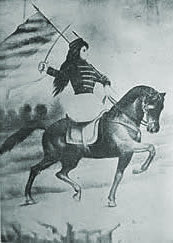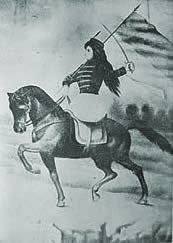
|
Women and Independence in Latin America An exploration of women's involvement in the Latin American Wars of Independence |

|

|
Women and Independence in Latin America An exploration of women's involvement in the Latin American Wars of Independence |

|
Gender:Female
Ethnic origen: Indigenous
Events:
| 1740? | - | Cuzco | - | Not applicable | - | She was born around 1740. |
| 1780 | - | Cuzco | - | Unknown | - | She was Cacique of Arocos, (Acos) Quispicanchis Province, Cuzco. |
| 1781 | - | Cuzco | - | Unknown | - | She was executed on 18 May 1781 in Cuzco. |
Connections:
Túpac Amaru RebellionBiography:
Born around 1740, she was the Cacique of Arocos who took part in the Túpac Amaru rebellion. (Knaster, 468.)
She wrote letters to Micaela Bastidas addressed, “Señora Doña Micaela Bastidas” and signed “Su mínima Tomasa”. There are others to Bastidas dated 4 and 9 December 1780. She wrote to José Gabriel on 21 November 1780, “Mi más amantísimo hermano y señor” and ended it “Besa la mano de Vuestra Merced su minísima -Tomasa". She was executed on 18 May 1781 with 8 other people among them Hipólito and José Gabriel Túpac Amaru and Micaela Bastidas. (Cornejo Bouroncle, 105, 112-113)
When she was captured, she was told to denounce the movement's leaders. She refused to do so "con una serenidad de santa". She was offered freedom for herself and her children if she spoke out, but refused and was condemned to a terrible death. (García y García, 168)
A curaca, she was an active officer in the insurgent army who led a brigade of women soldiers. They successfully defended the bridge of Arcos against the Spaniards. (Silverblatt, 123)
She was married to Faustino Delgado, and aged over 40 in 1782. (O'Phelan, 305) She apparently supported the Túpac Amaru rebellion "to enforce a royal decree in which His Majesty enabled to rebel to abolish the corregidores, the distribution of goods and the Custom Houses". Túpac Amaru had forced her to follow him by seizing her house and property. (O'Phelan, 220)
In 1783 she was charged with having provided troops and taking part in the siege of Cuzco with Túpac Amaru. (Campbell, 193)
She provided finds and supplies for the rebels and led a group of women who held the Pilpinto pass for over a month. (Socolow, 161)
Fisher names her as a "brave and bold" woman who was one of the main instigators of the rebellion. She supplied Túpac Amaru with silver, supplies, gave him information and gathered recruits. She wrote to Bastidas and Túpac Amaru. (Fisher, 1966, 192, 209)
She did not give away much information during her trial and was convicted, hung and quartered. (Fisher, 1966, 232-234)
References:
Campbell, Leon (1985) Women and the Great Rebellion in Peru, 1780-1783
Cornejo Bouroncle, Jorge (1949) Sangre Andina, Diéz mujeres cuzqueñas
Davies, Catherine, Brewster, Claire and Owen, Hilary (2006) South American Independence. Gender, Politics, Text
Fisher, Lillian Estelle (1966) The Last Inca Revolt
García y García, Elvira (1924) La mujer peruana a través de los siglos
Guardia, Sara Beatriz (1985) Mujeres peruanas: El otro lado de la historia
Knaster, Meri (1977) Women in Spanish America: An Annotated Bibliography from Pre-Conquest to Contemporary Times
O'Phelan Godoy, Scarlett (1985) Rebellions and Revolts in Eighteenth Century Peru and Upper Peru
Silverblatt, Irene (1987) Moon, Sun and Witches: Gender Ideologies and Class in Colonial Peru
Socolow, Susan Migden (1999) The Women of Colonial Latin America